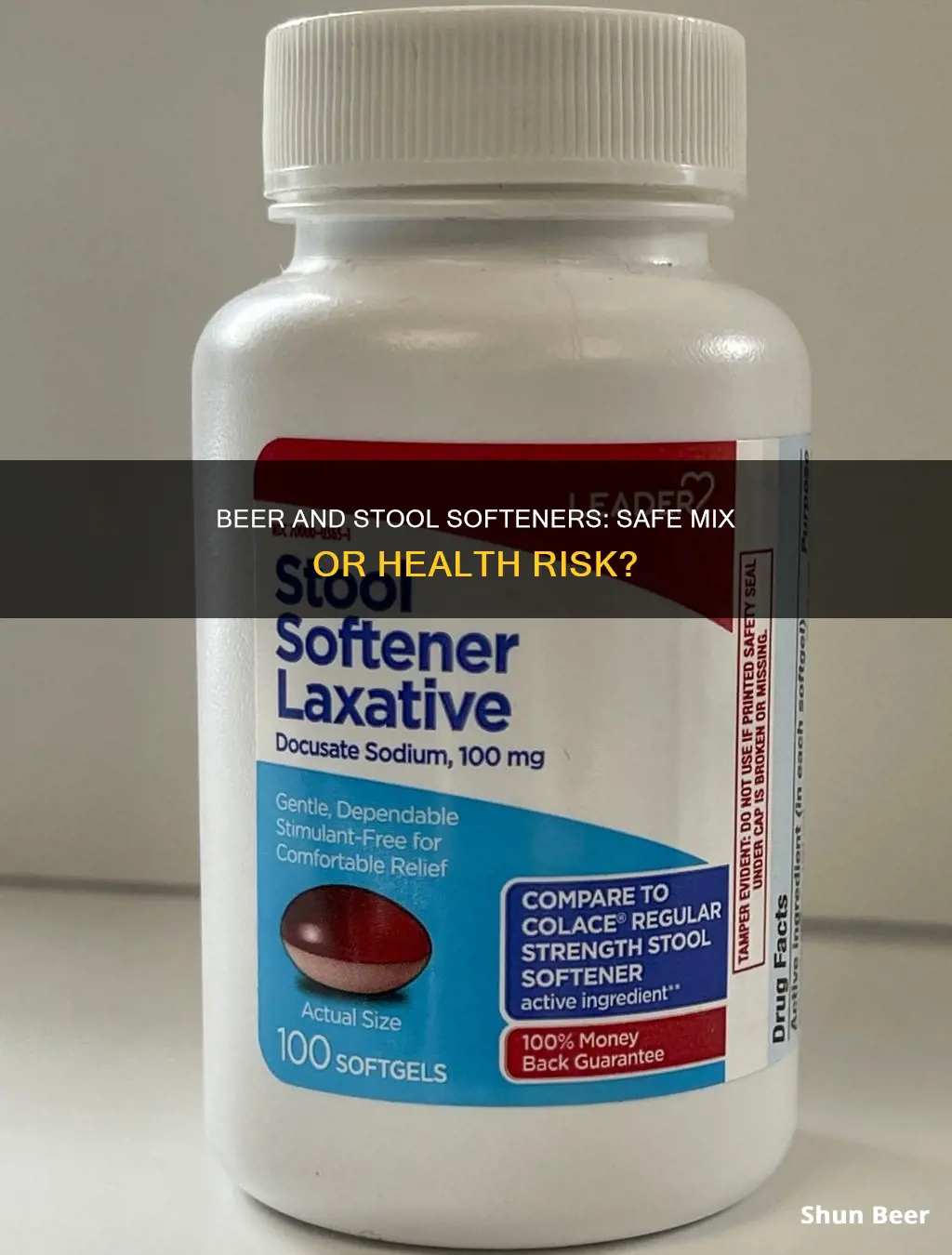
Alcohol can affect your bowel function, and drinking beer can cause constipation. Stool softeners are a type of laxative that can provide relief from constipation. They work by increasing the amount of water and fat that your stool absorbs, making it softer and easier to pass. However, it is important to consult with a doctor or pharmacist about how medications might interact with alcohol.
What You'll Learn

Can drinking beer cause constipation?
Drinking beer can cause constipation, but it depends on a variety of factors, including how much you drink, how often you drink, and your body's unique response.
Dehydration
Alcohol is a diuretic, which means it causes your body to produce more urine than usual. This can lead to dehydration, a common cause of constipation. When dehydrated, the body attempts to retain as much water as possible by drawing it from the stool, resulting in hard and dry stools that are difficult to pass.
Inhibited Intestinal Movement
Alcohol inhibits intestinal peristalsis or intestinal movement, which can lead to constipation. Drinks with an alcohol content of more than 15% have an inhibitory effect on peristalsis, slowing down gastrointestinal motility. On the other hand, beverages with lower alcohol content, such as beer, can increase gastric emptying rates.
Inflammation and Irritation
Alcohol can irritate the intestinal lining, causing inflammation and affecting the body's ability to absorb nutrients. This can lead to an increase in waste material, which may contribute to constipation. Chronic alcohol exposure can also lead to gastritis, or irritation of the stomach lining, causing stomach pain and diarrhea.
Electrolyte Imbalance
Alcohol causes a loss of electrolytes such as sodium and potassium, which are essential for retaining moisture in the stool. Electrolytes are quickly lost through profuse urination, diarrhea, and vomiting associated with excessive alcohol consumption.
Overgrowth of Intestinal Bacteria
Alcohol can cause an overgrowth of intestinal bacteria, leading to bloating and constipation. Additionally, the metabolization of alcohol in the gastrointestinal tract can lead to inflammation, causing various symptoms, including constipation.
Recommendations to Prevent Constipation
To prevent constipation while drinking beer or other alcoholic beverages, it is important to stay hydrated by drinking water or other hydrating beverages. Drinking a glass of water for each alcoholic drink is a good rule of thumb. It is also advisable to avoid caffeine and sugary drinks, as these can further contribute to dehydration.
Exercising, consuming probiotics, and eating high-fiber foods can also help prevent constipation. Most importantly, drinking in moderation is key. For women, this means up to one drink per day, and for men, up to two drinks per day.
Maryland Beer Laws: Drinking in Your Yard
You may want to see also

How does alcohol affect the digestive tract?
Alcohol can have a detrimental effect on the digestive tract, and frequent or excess consumption can damage the organs involved in the digestive process. Here's how alcohol affects the digestive system:
Mouth and Throat
Alcohol can quickly penetrate the saliva in your mouth and, when converted to acetaldehyde, can damage the tissues in the mouth. A British study found that approximately one-third of mouth and throat cancers were caused by drinking alcohol. When combined with smoking, alcohol may further increase the risk of mouth cancer.
Oesophagus
Once swallowed, alcohol can damage the cells of the oesophagus and increase the risk of oesophageal cancer. It can also cause acid reflux, which can further damage cells and increase cancer risk. Alcohol impairs the function of the muscles separating the oesophagus from the stomach, contributing to heartburn.
Stomach
Alcohol interferes with the stomach's function by affecting acid production and diminishing its ability to destroy harmful bacteria. This interference can allow bacteria to enter the upper small intestine and cause inflammation and lesions. Beverages with more than 15% alcohol volume can delay stomach emptying, leading to bacterial degradation of food and abdominal discomfort.
Liver
The liver is responsible for removing toxins from the body. However, when processing alcohol, the liver converts it into acetaldehyde, a toxic chemical that can damage cells and cause inflammatory changes, leading to fatty liver disease and cell damage.
Intestines
Alcohol reaches the large intestine via the bloodstream and can increase the risk of bowel cancer. Research suggests that heavy drinkers are at a significantly higher risk of colorectal cancer compared to non-drinkers. Alcohol may also impair muscle movement in the small and large intestines, contributing to the diarrhoea often observed in alcoholics.
Overall Effects
Alcohol inhibits the absorption of nutrients in the small intestine and increases the transport of toxins across the intestinal walls, leading to alcohol-related damage to the liver and other organs. It can also cause episodes of heartburn and reflux, as it relaxes the ring of muscle at the bottom of the gullet, allowing acid to reflux into the oesophagus.
Beer and Abs: Is It Possible to Have Both?
You may want to see also

Can I take a stool softener after drinking beer?
Stool softeners are a type of laxative that can provide relief from constipation. They are usually taken at bedtime and should only be taken when needed. It is not recommended to take them for more than a week unless directed by a doctor.
Alcohol, on the other hand, is a central nervous system depressant that can affect bowel function. While alcohol can cause constipation in some people, it can have the opposite effect in others. The type and amount of alcohol consumed play a role in this. Beer, for example, is a non-distilled alcoholic beverage that can increase acid secretion in the stomach. High doses of alcohol can slow gastric emptying and bowel motility, leading to constipation. Additionally, dehydration caused by alcohol consumption can contribute to constipation as the body needs water for stool formation.
Therefore, it is generally not recommended to take a stool softener after drinking beer or any other type of alcohol. Alcohol can already cause constipation in some individuals, and combining it with a stool softener may not be safe. Additionally, alcohol can interfere with many medications, including laxatives, as both are metabolized by the liver. This could impact the effectiveness of the medication and increase the risk of side effects.
If you are experiencing constipation after drinking beer, it is advisable to try other methods to relieve constipation, such as increasing your water intake, getting regular exercise, and consuming more fibre. If the constipation persists or becomes a frequent issue, it is best to consult your doctor for personalized medical advice.
Beer and Diverticulitis: What's Safe to Drink?
You may want to see also

What are the side effects of stool softeners?
While stool softeners are generally considered safe to use, they do carry the risk of certain side effects. Here are some of the possible side effects associated with the use of stool softeners:
- Stomach-related issues: This includes stomach pain, intestinal cramps, and nausea. These side effects may be more likely if you have existing gastrointestinal issues.
- Diarrhea: Stool softeners can sometimes lead to loose stools or diarrhea, especially if the recommended dosage is exceeded.
- Throat irritation: Oral stool softeners, especially in liquid or syrup form, can irritate the throat. This can be mitigated by mixing the medication with fruit juice, milk, or infant formula.
- Allergic reactions: Although rare, serious allergic reactions such as hives, itching, swelling of the face, tongue, or throat, and difficulty swallowing or breathing may occur. If you experience any of these symptoms, seek immediate medical attention.
- Rectal bleeding: This is considered a serious side effect, and you should notify your doctor right away if it occurs.
It is important to note that the side effects of stool softeners may vary from person to person, and not all possible side effects are listed above. Always read the instructions and follow the directions on the packaging. If you experience any adverse effects, consult your healthcare provider for guidance.
Beer and Golo: What You Need to Know
You may want to see also

Are there alternatives to stool softeners?
Stool softeners are a type of laxative that can provide relief from constipation. They are usually taken orally, in the form of tablets, capsules, syrup or liquid. However, there are also rectal enema stool softeners.
There are natural alternatives to stool softeners that can help with constipation. These include:
- Drinking more water: Water mixes with stool to prevent dry, hard masses from forming, making it softer and easier to pass.
- Getting regular exercise: Exercise is a well-known gut stimulant and can reduce the effects of constipation.
- Increasing your daily fibre intake: Fibre helps to add bulk to stool, making it easier to pass.
Additionally, if you are experiencing constipation due to alcohol consumption, there are some measures you can take to prevent this:
- Drink water: Aim for drinking a glass of water for every alcoholic beverage. You can also drink electrolyte-containing beverages to replace lost electrolytes, but avoid those with a lot of sugar.
- Avoid caffeine: Caffeine is a natural diuretic, so it's best to avoid drinks that contain it.
- Exercise: Exercise is a gut stimulant and can help reduce constipation.
- Take a probiotic: Probiotics introduce healthy bacteria into the gut, which can encourage healthy digestion.
It is important to note that you should consult your doctor or pharmacist before taking any new medications or supplements, especially if you are pregnant, breastfeeding, or have any existing health conditions.
Beer and Diarrhea: Should You Drink or Ditch?
You may want to see also
Frequently asked questions
While there is no direct contraindication for taking stool softeners after drinking beer, alcohol can cause dehydration, which can lead to constipation. It is generally recommended to take stool softeners at bedtime, and only when needed.
Stool softeners are generally considered safe, but they may cause side effects such as stomach pain, nausea, and diarrhea. If you experience severe side effects, such as hives, swelling of the face, tongue, or throat, or difficulty swallowing or breathing, seek medical help immediately.
Stool softeners usually take between 12 to 72 hours to start working. However, relief from constipation is typically seen within 1 to 3 days of regular use.







